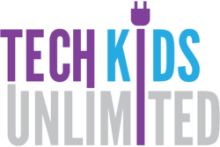TD Bank’s John Pluhowski greets a TKU student at Tech Kids Unlimited in November 2022.
In recent years, there has been growing recognition of the value of neurodiversity in the workplace. Yet neurodiverse individuals still face significant challenges in finding and retaining meaningful jobs.
Autism Speaks in a 2021 report says that nearly half of 25-year-olds with autism have never held a paying job. Opportunities are farther in-between for low-income neurodiverse youth, who face worse outcomes than their peers according to a 2019 report from the Drexel Autism Institute. Organizations such as Tech Kids Unlimited (TKU) work to change that by preparing neurodiverse youth for the workplace. TKU’s Career Ladder programs emphasize work-based learning and career readiness; Creative Tech Internship, Digital Agency and the Career Readiness Internship Summer Program are three such programs TKU offers.
Entering the workforce can be tricky for neurodiverse young adults. In Fall 2022, TKU hosted a talk about best practices to follow when looking for jobs and invited John Pluhowski, TD Bank’s Chief Communications Officer and the U.S. Executive Lead for Individuals with Diverse Abilities to speak. “We believe we are stronger when we hire people with disabilities who possess the diverse experiences and talents we seek to drive our business forward,” Mr. Pluhowski said to a room full of neurodiverse students.
TD Bank was ranked #1 in DiversityInc’s 2022 list of Top Companies for People with Disabilities. The bank has also been named one of the leading disability employers for the past six years by the National Organization on Disability. “We understand the responsibility we have to invest in community organizations like TKU that are creating opportunities for students that are making our world more inclusive,” Mr. Pluhowski said. TD Charitable Foundation is a TKU supporter for career readiness programs. Key takeaways from the chat about how neurodiverse individuals can approach finding and retaining a job are summarized below.
The Q&A was edited for length and clarity.
TKU Board Member Harrison Lung moderated the talk with John Pluhowski at NYU Ability Lab in Brooklyn.
Approaching the Job Search
- Have a goal: “Know where you want to go,” Mr. Pluhowski said. He advised the students to be grounded in what they want to do and to think about a skillset they would like to hone as they prepare to enter the workforce.
- Get out there: “Make sure you are engaging in social channels and career platforms where organizations such as TD Bank are looking for talent,” he said. LinkedIn has become a place where organizations go to look for talent. Mr.Pluhowski also suggested checking portals dedicated to neurodiverse job seekers such as Microsoft’s Neurodiversity Career Connector.
- Build your network: Follow companies whose values align with yours. Learn as much as you can from these organizations, check their job listings. “Remember, you are your biggest advocate. Let your voice be heard and don’t be shy about reaching out to people that already work there who can help you. “The job that you seek is waiting for you, what you have to do is make sure you stand out from the crowd of job applicants,” Mr. Pluhowski said. “Look for companies that have Diversity Hiring Managers,” he said. These organizations are the ones you want to look out for because they have built neurodiversity into their hiring practices.
- Gather some work experience: Internships are super important, he added. They show you have work experience and can help you expand your network. It is important to reach out to people in your network who can support you. Support can look like revising your resume, helping you prepare for interviews, or connecting you with another person.
- Maintaining a job: Once you “land the job of your dreams,” Mr. Pluhowski said, you want to do these 3 things that will set you up for success: be a good listener, ask questions, and do your homework. You want to expand your network by making as many connections as you can because you never know when the next opportunity will present itself. Oftentimes, it’s when you least expect it.”
Room for Improvement
While there are companies looking for neurodiverse talent, there is still much to improve. In a recent TKU project, an analysis was done on the use of the words “neurodiversity” or “autism” on websites belonging to the 100 top global corporations. The analysis found that 60 percent of the corporations on the list, including names such as Meta Platforms, Intel, and General Motors do not mention the words neurodiversity or autism on their websites. Whereas 36 percent of the corporations listed the terms in their Diversity Equity and Inclusion efforts or wrote about hiring employees with autism.
By embracing neurodiversity in the workplace, companies can support their employees, regardless of their neurological differences, and reap the benefits of having a diverse workforce with a wide range of perspectives and skills.
——————-
Key Takeaways
1- Figure out where you want to be and look for jobs that can help you reach your goals.
2- Learn about companies that you would like to work for.
3- Engage in social channels/career platforms (LinkedIn) where these organizations seek talent.
4- Seek an internship and look for job experience that will help you stand out from the crowd.
5- Ask your personal network for help on your career journey.
By Laura Olivieri
